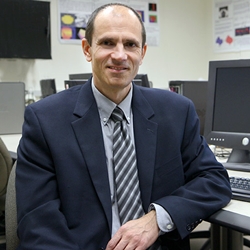10 April 2015. Two University of Texas campuses, in Dallas and nearby Arlington, formed a research center to study software solutions for assistive technologies that benefit disabled and able-bodied people alike. The iPerform Center for Assistive Technologies to Enhance Human Performance, funded for five years by National Science Foundation, is also enlisting industry partners that would give them early access to the center’s work.
The joint project takes a broader view of assistive technologies, a term usually associated with solutions to help people with disabilities. The center plans to examine software for computer-assisted tools such as prosthetics for amputees, robotics to help people with failing eyesight, and smart wheelchairs. But the same techniques can be extended to solutions to help elderly people cope with day-to-day life and live securely in their own homes: e.g., better designed homes to prevent accidents, enhanced telecommunications, and application of games for rehabilitation.
Another extension of assistive technologies is for health care delivery, such as sensors to detect gestures or facial movements, along with speech recognition for personalized therapies. In addition, the same technologies can be applied to manufacturing to improve the efficiency of human-machine interactions and increase worker safety.
The iPerform Center is led by computer science professors Ovidiu Daescu at UT-Dallas and Fillia Makedon at UT-Arlington. Daescu studies algorithms using computational geometry as well as biomedical computing applications. Makedon conducts research on human-centered computing, particularly in health care, manufacturing, and vocational safety. Several faculty from each campus plan to take part as co-investigators.
In a UT-Dallas statement Daescu notes “There currently is no research hub in the country for assistive technologies,” adding “The projects conducted within the center will help advance basic research in areas such as computer vision, machine learning, user interfaces, brain imaging, human robot interaction, human computer interaction, virtual reality and simulation.”
The joint project is funded under National Science Foundation’s Industry/University Cooperative Research Center program, where NSF makes a small initial seed grant, and the universities recruiting industry partners to fund the bulk of the center’s activity. UT-Dallas reports attracting three companies as industry partners — Bosch North America, Raytheon Co., and Texas Instruments — as well as National Institute of Standards and Technology, an agency of U.S. Department of Commerce.
An industry partnership, at an annual fee of $40,000, offers companies early first-hand access to the results of iPerform’s work and the opportunity to collaborate with faculty and graduate students at the two campuses. Industry partners also get to recommend research projects and vote on the center’s annual research agenda.
Read more:
- Univ. Lab Creates Open-Source Intelligent Assistant
- Robotics Designed for Laundry and Other Uncertain Tasks
- Report: U.S. Edge in Advanced Industries Slipping
- Spin-Off Building Simplified Signal Processing Connections
- IBM, Health Tech, Univ Designing Critical Care Mobile System
* * *


 RSS - Posts
RSS - Posts
You must be logged in to post a comment.